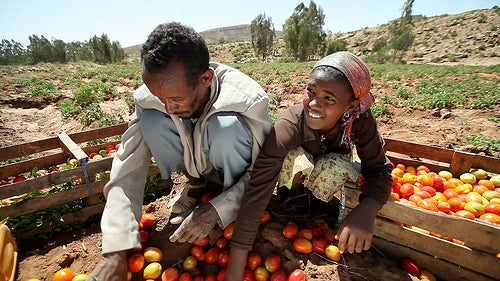 Five hundred million. That’s the official estimate, the number that practitioners arrive at from a range of 200 to 900 million. That is the number of smallholder farmers in the world, and it makes a lot of eyes pop in development circles.
Five hundred million. That’s the official estimate, the number that practitioners arrive at from a range of 200 to 900 million. That is the number of smallholder farmers in the world, and it makes a lot of eyes pop in development circles.
Take for example the most recent agribusiness value-chain event, Making the Connection: value chains for transforming small holder agriculture, which convened recently in Addis Ababa, Ethiopia. While the 500 attendees represented the private sector, government, civil society, farmers’ organizations and academia, almost all discussions had a way of looping back to one topic: smallholders.Why is it that the attendees were so fixated on the farming segment of the value chain? Is Africa not yet ready to climb past the very first rung of the value chain? Today, it is estimated that a mere 10% of the global agricultural production undergoes processing.
As Hasit Shah of Kenya’s Sunripe Group put it at the conference, "There’s a lot of opportunity in Africa, and it’s amazing that we don't see it ourselves."
Of course, seeing opportunity is one thing; exploiting it, quite another. For professor David Hughes, Emeritus Professor of Food Marketing at Imperial College, London, agribusiness is risky business: lessons learned from 50 years of investment in agribusiness show that only a minority of agribusiness investments were commercially successful.
Professor Hughes also eloquently argued that commercial social responsibility (CSR) is passé, and shared value is the right way to think about value chains. If you are looking to increase the competitiveness of an industry, and thus its volume, you have to look for ways to create shared value—win-win solutions or incentives for each actor at the respective value chain node, whether it be from input provider to farmer, from farmer to processor, or from processor to retailer.
Sunripe in Kenya spends US$ 150,000 annually just to comply with standards because that is the ticket to export markets beyond Africa and the Middle East. This means that smallholders—again, a major priority of European and American development agencies—find themselves locked out of the very same markets.
Setting aside the question of whether standards in wealthy nations have gone overboard, this state of affairs should make us wonder whether African companies ought to target these markets at all. What about their domestic market? What about their regional and continental markets? There they can put their resources into meeting food safety standards and basic environmental standards. For Michael Nkonu, Fairtrade Africa, “the future lies in developing domestic and regional markets.” First build up, then build out.
With the accelerating urbanization of Africa, consumers are increasingly concentrated and are looking for more high-protein and convenient foods. Supermarkets providing processed foods have hence been expanding across the continent over the past 20-30 years. But people like Emmanuel Tambi from FARA are rightly asking, “Is the expansion of supermarkets good for the Africa? Who benefits from it?”
Essentially, how can we ignite competitive domestic agricultural processing businesses and help them find their way into supermarket distribution channels to generate shared value across the continent?
At infoDev, we are grappling with this very challenge as we design our Agribusiness Innovation Centers, due to launch next year, so I invite you to share your thoughts in the comments.



Join the Conversation